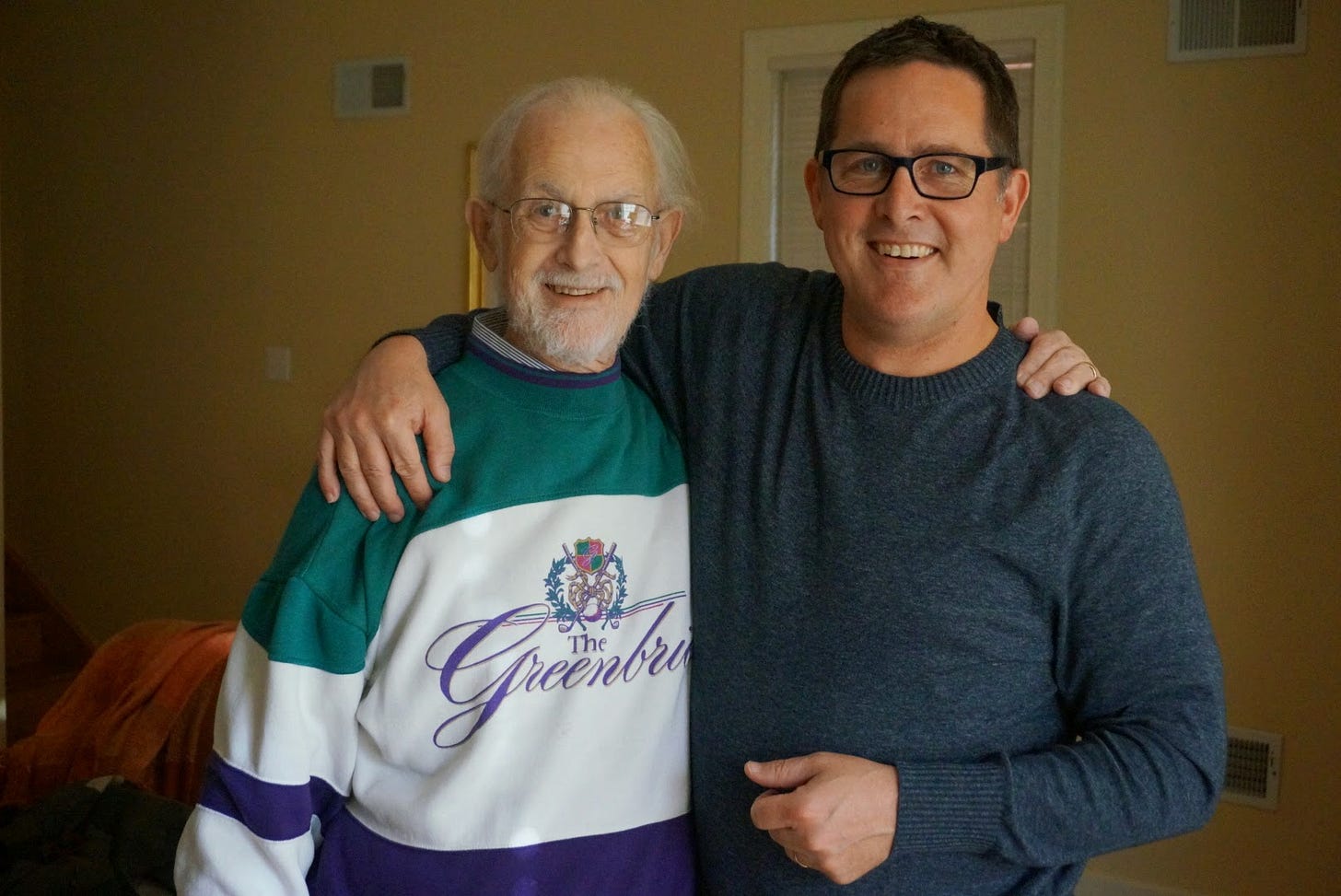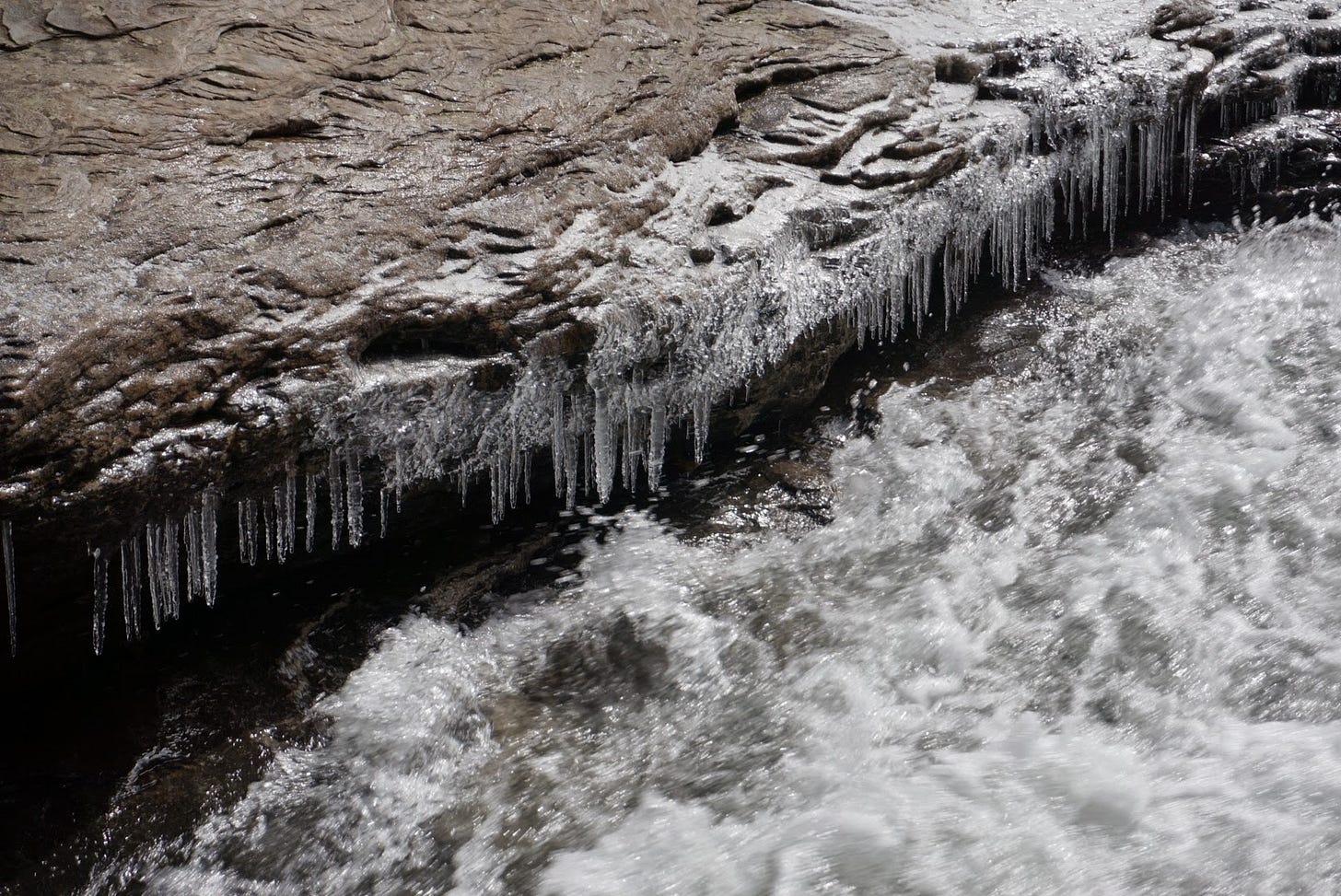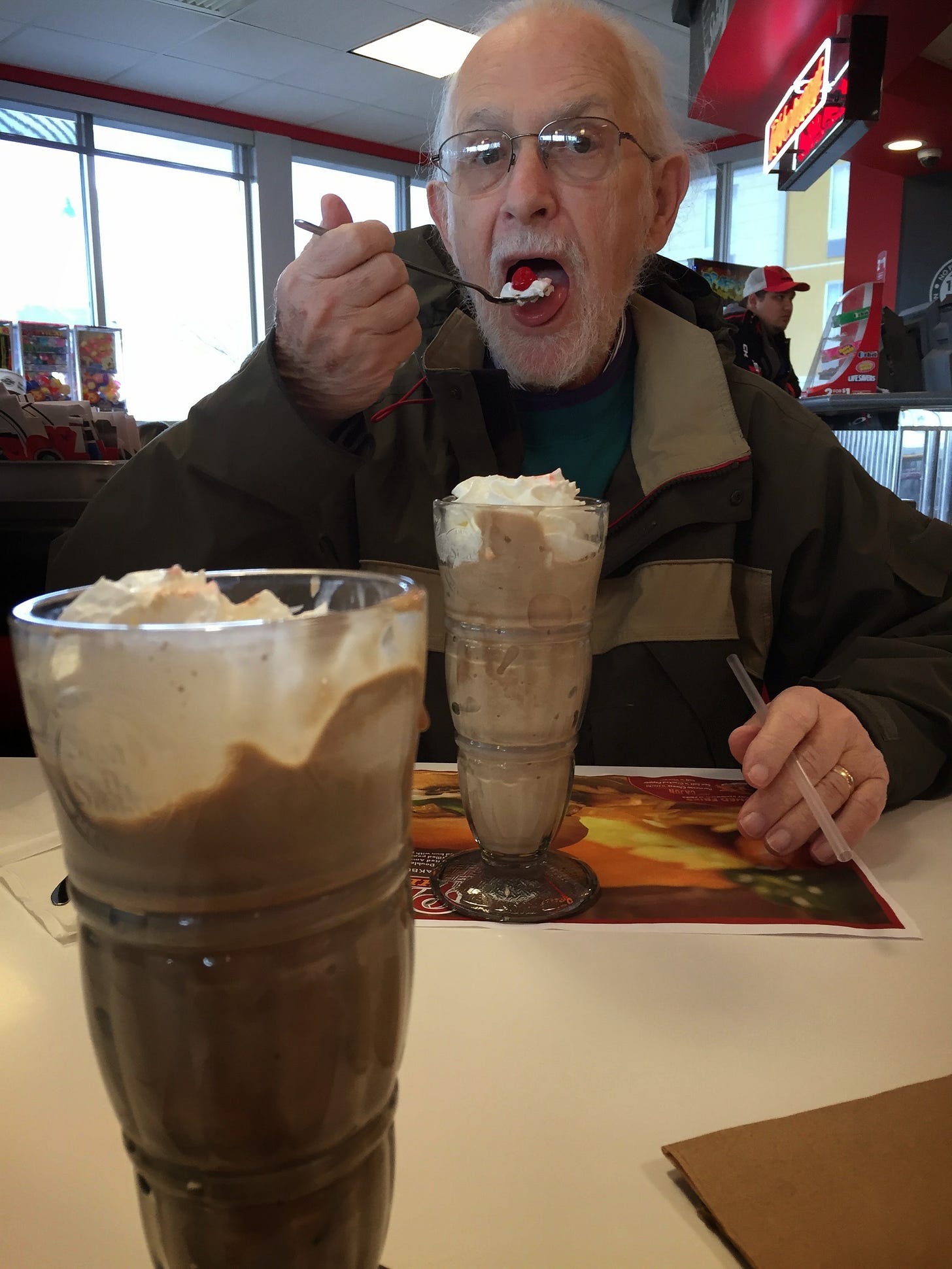My Dad
No matter how many times I look under this rock, there's nothing there
Here’s what I find myself doing when I write: I pick up a memory or an experience and I turn it in my hands, looking at it from all sides, trying to figure out what it means. Usually, I come up with a satisfactory answer. But some things are enduring mysteries, enigmas. No matter how many times I return, I find no answers. That’s my relationship with my dad.
The last time I saw my dad was outside the Hillman Cancer Center in Pittsburgh, Pennsylvania.
Dad didn’t live in Pittsburgh. He lived on borrowed time in a golf course community in Naples, Florida, in one of three houses he’d bought during the real estate boom, when he was flipping houses and zipping around in his Burgundy Red Porsche 911. He’d been giddy then, giddy at his luck at living at a time when you could buy a house, do a few cosmetic upgrades, and then flip it, turning a quick profit. He played this trick five, six times, until he thought he knew it by heart. Then one day he got caught holding three houses, right when the market crashed. He never thought he’d be dying of cancer while trying to make some deal that would keep him in a house and out of bankruptcy court. He had kicked prostate cancer, but now the cancer was back at him, worse this time, and Dad was in a worse place too.
I’d had no part in Dad’s first battle with cancer. It had come during the long stretch when we didn’t speak, and so the only thing I heard of his prostate cancer was from my brother, Pete, who seemed to get fragments here and there. Dad never contacted me to let me know—but I never contacted him to let him know I knew either. There’s no rule book when your relationship is this screwed up.
Truth was, he had been as good as dead to me by then. I’d been through the grieving process of losing him after the traumatic break we’d had between the birth of my two kids. I always remember that it was between their births, because Dad acknowledged my first child, my son, but never really took into account that my daughter existed. He never learned her name, never asked about her by name. I’ve never forgiven him for that, and I’m not alone.
But he beat prostate cancer and eventually I stopped seeing the point of not talking to him, and so we started a tentative rapprochement, first by mail, then over the phone, and then finally he came out to visit one day in early summer, 20 years after I’d seen him last.
On the one hand, it was really easy: we just fell into easy conversation, found it easy and natural to be around each other. I’d had no real beef with my Dad before his divorce from my mom, before he spun off into some other orbit, and suddenly here he was, back in my orbit, and it felt natural as can be, except for one thing: I felt nothing for him. I had the muscle memory of a relationship, but when we sat having coffee on the second day and he broke down and said, “God Tom, it’s so nice seeing you and seeing your kids, I really want to be part of your lives,” all I could say in return was, “Dad, I don’t feel that much toward you any more. I don’t know if that will come back or not, but our break felt like your death and I’ve buried you in my past.” All my love for him had been burned out and I didn’t know if it could ever come back.
But I was willing to try and I kept trying: Conrad and I went down to visit him and his second wife, Judi, at their house in Naples once, and then Pete and I went down another time, when his finances were starting to fall apart but before the cancer came back. We watched an Ohio State football game in his living room and he fell asleep on the couch, happy. Would we, given enough time, have re-forged some kind of connection? I’ll never know.
Anyway, Pittsburgh.
Dad was in Pittsburgh because the cancer care center there, at UPMC, offered an experimental new therapy to blast out the pancreatic cancer that was killing him. “It knocks the shit out of me, Tom, but they think it could work,” he told me when he asked me to come. Judi’s family had pulled some strings to get him in. Judi’s cousin was a big deal lawyer in Pittsburgh.
He had been there two weeks, he told me on the phone, and would be there one week more, but if I came for a few days, he’d really like that. And then Judi got on, Judi who I never talk to, and said it would be a good idea if I came. That’s when I knew it must be serious. So I went.
Sara didn’t come. She’d have come if this had been traumatic for me, but oddly, it wasn’t: the 20 year gap in our relationship had dulled my capacity for pain. Still, he was my Dad, and I wondered if we should somehow “wrap things up,” either for him or for me. I wondered if we might get a chance to reflect on his life, to come closer to reconciling. I didn’t understand my dad, what had happened to my dad, how a guy who seemed to love his kids could become so distant and obtuse, just because he had divorced my mother. I wondered if maybe now, as he was getting near the end, he could shed any light on this giant mystery.
Dad was staying in an apartment near the medical center, in a place owned by Judi’s cousin. When I got there, Dad looked like hell—gaunt, his white hair straggly and limp, all the color drained from him. He’d been fighting this cancer for a year, though he’d barely mentioned it until the call when he told me he was in Pittsburgh. Prior to this it had just been “they’re running some tests” and “there are some cells we’re keeping an eye on.” But here he was, fighting cancer, and it looked like cancer was winning.
Judi was cordial to me; I was cordial to her. That was the best we could do. I didn’t blame her for my estrangement from my dad—but she was all wound up in it. She didn’t cause Dad to go off the rails after the divorce—she was just where he landed, and I always suspect she encouraged him to act in ways that no father should ever act. Still, she wasn’t even in the picture when Dad said to me, “I just have to protect myself,” and largely withdrew from my life. For me, Judi was just the weird place Dad landed after several years of spinning off out of control.
They set aside one whole day for me to be with Dad—agreeing it would be good for him and also good for Judi, who was worn down from caring for him. We took a couple of pictures the night I arrived, but Judi said he needed to take a nap, he got tired so easily, so I went back to my hotel. I’d be back the next day.
It was a pissy, cold late-March morning in Pittsburgh—any hopes of enjoying a spring day in the sunshine were washed away by a persistent cold drizzle. A few degrees colder and it would have been snowing. But we decided to go explore, down toward Frank Lloyd Wright’s Fallingwater house, in the scenic rolling country southeast of Pittsburgh.
I liked the idea of a road trip because those had always been good for the two of us. We had crisscrossed the country several times together, and the long open spaces always gave us time to talk, time to go deep on stuff. Road trips were where we connected. I remembered driving down a long grade in southern Utah, me driving, the sun shining brightly over the vast open landscape, and I held my foot on the clutch and let the car glide, picking up speed. Dad said I shouldn’t do that, it wore out the clutch, but he couldn’t explain it to me. I didn’t think it was true.
Anyway, we’d been driving a while in the freezing rain, just making small talk, but I wanted more—I wanted to see if we could close up the gap of our long estrangement, see if we could make sense of what we had been to each other and where we had gone awry.
I said, “Dad, we may not have many more times together …”
“I don’t see it that way Tom.”
“Well, Dad, I’m not saying right now, but you know, just in case, can we talk about what it means for you to go …”
“Tom, I’m going to beat this, I’m going to recover,” he said with as much energy as I’d seen from him all day.
“But Dad, what if you don’t recover …”
“I just don’t want to talk about it! I don’t want to talk about dying!”
And so we didn’t. We drove on, stepping out into the rain at Ohiopyle State Park beside the Youghiogheny River to take a short walk. But we hadn’t gone 100 yards when he got winded and tired and started to shiver, so we got back in the car and drove. He’d look at the scenery, but then he’d fall asleep. He said he was getting hungry, so we pulled into a Steak & Shake. All he wanted was a milkshake, so we both got a milkshake.
He had to be at the hospital in the morning for another treatment. I said I’d walk him in and he said no, he didn’t want me to see him in there. We hugged and he walked in with Judi.
That was the last time I saw him. A couple months later I got a call from him, late at night, from a hospital in Fort Myers, Florida. “It looks pretty bad, Tom, there’s some internal bleeding, but I’m going into surgery and they think they can stop it.” They couldn’t. He died in the hospital that night.
Pete and I and our boys flew down to Naples for the service in the July heat, and then we drove across the state to bury him at the IJ Morris Star of David Cemetery in West Palm Beach. It was both odd and fitting to see his casket slide into place in an above-ground mausoleum, safe from the rising waters of the nearby Atlantic, and far, far from me.







It's Mother's Day here in Spain, so it was a bit surprising to read this story about your relationship with your Dad. I thought the most insightful comment in the essay is that you already had mourned for your loss by the time he came back into your life. I am glad for you that you have that understanding. It's clear that you have found other (better) ways of being a father to and with your adult children. As for the essay, it takes courage to let the unresolved past remain unresolved. Thanks for sharing this story.
Wonderful essay and extremely powerful closing sentence. Just really superb, courageous writing.
My dad bailed when I was an infant and I only met him once when I was twenty-five years old. It was an odd feeling. I didn't know him and quickly assessed him for what he was: a stranger.
Just seeing he existed was all the closure I needed. I haven't talked to him since.